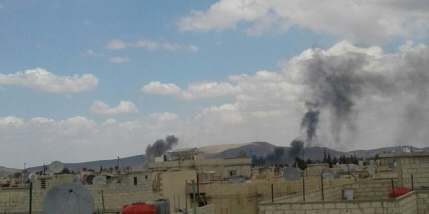The United Nations Relief and Works Agency for Palestine Refugees in the Near East (UNRWA), on Wednesday, deplored the escalation of the armed conflict in Syria which, in recent days, has claimed the lives of two Palestine refugees in the northern city of Aleppo, and continues to gravely endanger the safety of Palestine refugees in the Khan Eshieh camp of southern rural Damascus.
On June 4, at around 4:30 pm, 14-year-old Baraa Mahmoud Hosin Jomaa was killed in the Al Hamadaniyeh area of Aleppo city when an exploding rocket struck his home. He died as the area was being shelled by a barrage of munitions which caused dozens of deaths and casualties. On June 5, at approximately 10:30 hrs, Ms. Khairieh Zohir Siam, aged 41 years, was struck by a bullet from a sniper rifle while she was travelling in a commercial mini-bus in the Al Ramoseh area of Aleppo city. She was killed instantly, while another Palestinian refugee, a fellow passenger, was injured in the hand and neck. UNRWA strongly condemned the parties responsible for these deaths. The thoughts and condolences of UNRWA staff are with the bereaved families.
In related news, the Khan Eshieh camp of rural southern Damascus, intense fighting involving the use of heavy weapons and airborne munitions continues to endanger the lives of Palestine refugees and to damage and destroy civilian homes. On June 4, shortly before 1:00pm, the home of a Palestine refugee was targeted and severely damaged by a munitions explosive. This just follows the death of a six-year-old Palestine child refugee from an artillery explosion on May 27, and the death of five Palestinian refugees in two separate artillery strikes inside Khan Eshieh camp on May 17.
In an official statement, UNRWA said, according to the PNN, that it remains “gravely concerned” about the risk of death and serious injury to Palestinian refugees and other civilians throughout Syria. The Agency reiterates its demands on all parties to desist from exposing civilians to these risks. To save civilian lives, it is imperative that all sides respect and comply with their obligations to international humanitarian law.
Background information on Khan Eshiesh camp :
UNRWA in Syria provides vital humanitarian support and health and education services to 450,000 Palestine refugees. Over 95 percent of the Palestine refugees are wholly reliant on UNRWA humanitarian aid.
In the Governorate of Aleppo, UNRWA serves some 25,000 Palestine refugees who reside in Aleppo city and Neirab camp. Many of these refugees have experienced displacement. Ein El Tal camp (Handarat), located to the north of Aleppo city, was once home to around 7,000 residents. In April of 2013, armed groups entered the camp, forcibly displacing the entire population over a period of some 48 hours. As the camp has been a theater of armed conflict since then, it is likely to have sustained extensive damage. Neirab camp is southeast of Aleppo city and is situated just adjacent to an airport. The camp’s 15,000 residents include Palestinian refugees displaced from Ein El Tal and further afield. Neirab residents have experienced the effects of armed conflict at varying intensity since the year 2012.
Khan Eshieh camp, home to about 9,000 Palestinian refugees, is located in a volatile area in the rural area to the south of Damascus, where spikes in violence have caused the deaths of seven Palestinian refugees in the past two weeks. Since 2012, the farms and fields surrounding the camp have been active battlegrounds in which heavy weapons have been deployed, often with indiscriminate impact. Some 75 UNRWA staff residing in the camp strive to maintain support to Palestine’s refugees through limited services offered in three schools, a health clinic and a community centre.
UNRWA’s work is impeded by the fact that since 2013, humanitarian access to Khan Eshieh has been constrained. To receive assistance, Palestinian refugees must travel at great personal risk to UNRWA distribution centers in Sahnaya or Khan Dannoun.
According to UN statistics, Palestinians now make up the largest refugee population in the entire world.
Search IMEMC: “UNRWA”

